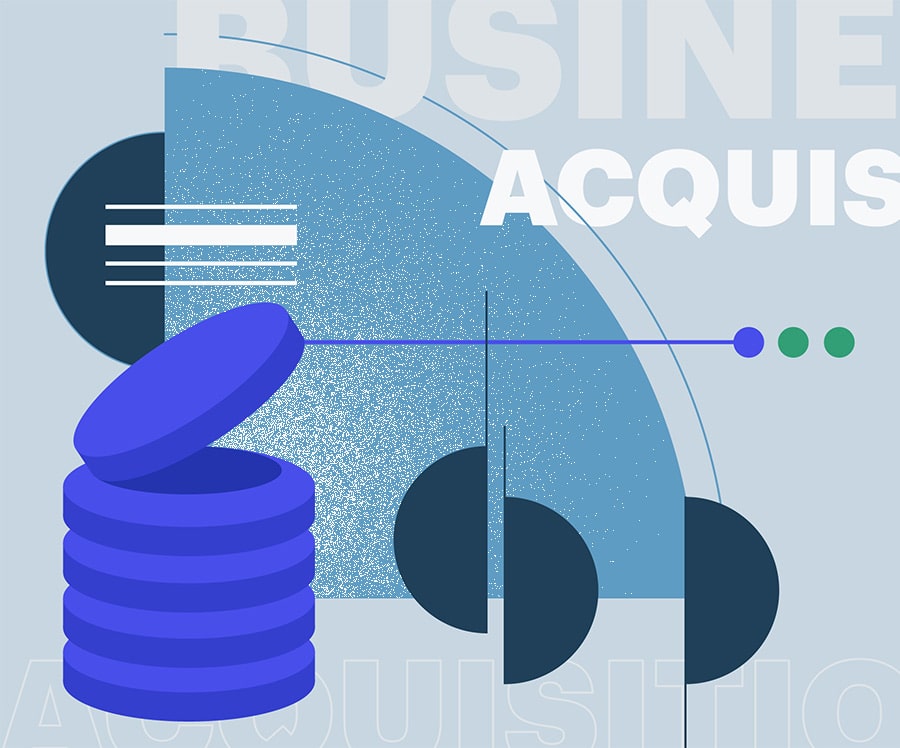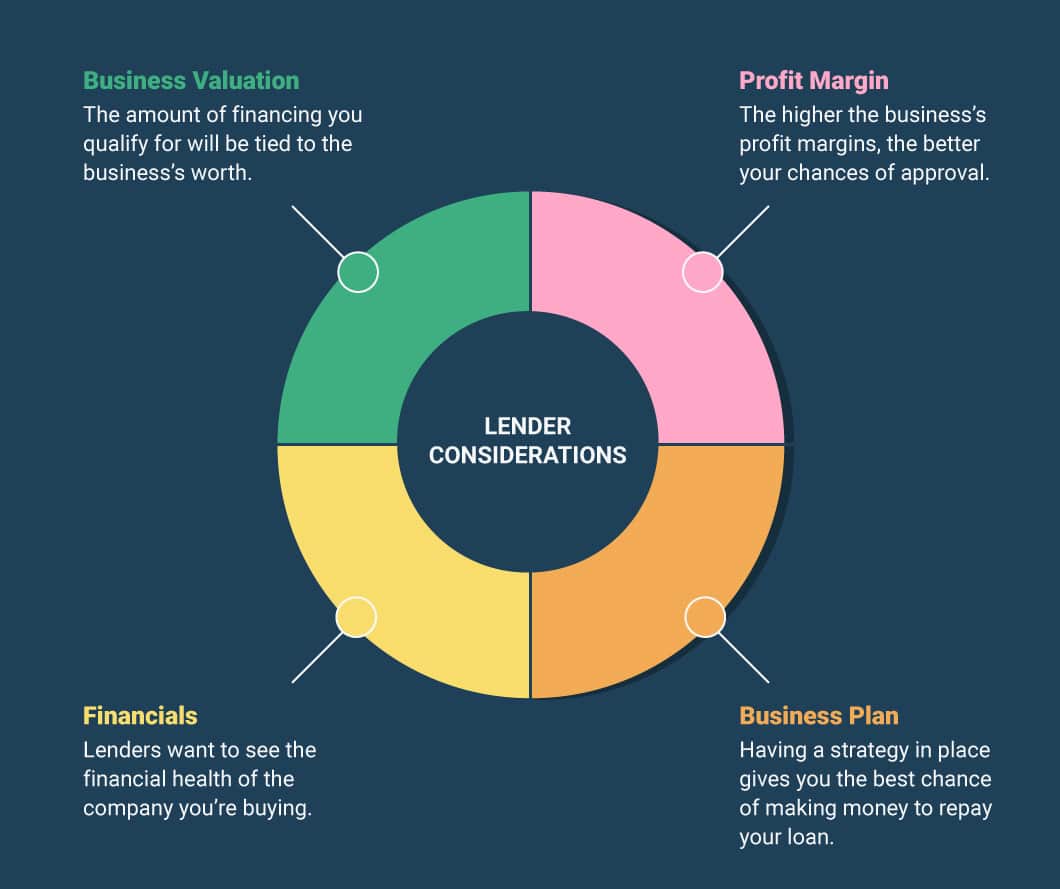A business acquisition loan can help you navigate the costly process of buying an existing small business.
Let’s go through your options for financing a business purchase. We’ll also review lenders’ requirements and how to apply for a small business acquisition loan.
“With a solid business plan and good credit history, it’s possible to get the business acquisition funding you need to become your own boss.”
What Is a Business Acquisition Loan?
A business acquisition loan is any commercial financing taken out by a borrower to buy an existing business or open a franchise.
Acquiring a business usually involves more up-front capital than a budding entrepreneur or current small business owner typically has to offer, making business acquisition financing options necessary. Lenders can bridge this gap.
How Do Acquisition Loans Work?
Commercial acquisition loans typically provide upfront funding to purchase either an entire business or its assets, including buildings, equipment or even intellectual property. There are several loan types to buy an existing business, such as term loans and Small Business Administration (SBA) loans. Terms vary according to the financing option.
Borrowers usually provide a down payment for this financing, and the acquired business and its assets can serve as collateral.
Business Acquisition Financing Options
If you need a loan to buy an existing business, there are multiple options to finance an acquisition.
Here’s a look at each option to help you determine which is best for you.
Compare loan options.
Term Loans
Term loans are a great business acquisition financing option.
With these loans, the borrower receives a sum of money with a specified repayment schedule. Term lengths can range from 1-5 years, depending on the lender. Interest rates can be lower than other financing options. For example, lending partners with Fast Capital 360 offer interest rates starting at 7%. However, with longer repayment terms and lower interest rates, lenders can have stricter requirements for approving this business purchase loan. Lenders may require:
- Collateral or a personal guarantee
- A minimum credit score of 600 to 670, depending on the lender
- Businesses to have been in operation a year
Short-Term Loans
If it’s challenging to qualify for a medium- or long-term loan to buy an existing business, many lenders offer short-term loans with lower requirements.
For example, Fast Capital 360’s lending partners require the following for financing approval:
- At least 1 year in business
- More than $75,000 in annual revenue
- 540+ credit score
With a shortened payoff period (usually less than 2 years), lenders minimize the time a borrower has to miss payment or default on the loan. Short-term loans can help you cover a temporary capital gap your business is experiencing, serving as a bridge loan for business acquisition.
Because short-term loans have less strict requirements, they can have higher interest rates than longer term loans. Fast Capital 360’s lending partners’ interest rates start at 10%.
SBA Loans
Small Business Administration (SBA) loans are a popular alternative for entrepreneurs who can’t qualify for conventional term loans.
The SBA itself doesn’t disburse these loans but acts as a guarantor, backing a portion of the loan if the borrower cannot pay. This mitigates risk for the lender.
An SBA business acquisition loan is made through the agency’s 7(a) loan program, which allows borrowers to take out up to $5 million and has term lengths up to 25 years, depending on loan usage. Note that the SBA’s 504 loan can be used to purchase business assets such as real estate and equipment and can fund renovations, but it can’t buy the entire business.
Interest rates are capped at a percentage over the current prime lending rate.
SBA business acquisition loan requirements are strict. You must have a credit score of 650 or better and meet other criteria. Another general lender requirement is to have $1 in cash or assets for every $3 you borrow. This ensures you can still repay the loan if your new business doesn’t get off the ground as quickly as you anticipate.
Business Acquisition Loan Down Payment
Note that most options to finance an acquisition require a down payment or “equity injection.” The percentage varies according to funding type and lender, but it can range from 10% (for some SBA loans) to more than 20%.
It’s unlikely to obtain no money down business acquisition loans from conventional or alternative lenders. You could receive 100% seller financing, but it might not be the best deal for you. As Commercial Capital points out, sellers often want immediate payment, and forgoing a business acquisition loan down payment could be a sign that something’s amiss with the company.
Business Acquisition Financing: Pros and Cons
| Pros | Cons |
| ✔ Fund your business goals
✔ Varied financing options |
✖ Interest rates |
Before you apply for business loans to buy an existing business, it’s important to know the advantages and disadvantages. While a small business acquisition loan can help fund your business expansion dreams, weigh whether you can manage the repayments.
Pros
- Access to funding to help achieve your business goals: Getting a business purchase loan allows you to buy an existing business when the time is right — not only when you have enough cash on hand.
- Funding options for every type of business: Whether you need a short-term bridge loan or long-term financing, there are many avenues to business expansion. You can also be approved for a business acquisition loan and receive funding in a matter of days, depending on the lender.
Cons
- Interest rates added to your expenses: When you take out a loan to buy an existing business, remember you have to pay back the principal and interest. Depending on your creditworthiness as a borrower and the type of financing you receive, your interest rate could be higher than average. So make sure you consider your ability to meet this added expense before committing to a small business acquisition loan.
Business Evaluation Factors
When you apply for a business acquisition loan, lenders must evaluate the company you’re buying.
Lenders review multiple details to ensure you’re purchasing a viable business and will be able to pay off your loan.
The following aspects are included in their evaluation:
Business Valuation: Lenders will need an updated and accurate business valuation from a third party to begin evaluating your application. The business’s past, current and future performance is considered along with its assets. The amount of financing you qualify for will be tied to the business’s worth.
Financial Statements: This can include tax returns and bank statements. Like when you apply for a loan for your own business, lenders want to see the financial health of the company you’re buying.
Profit Margins: Lenders want to know you can repay your business purchase loan; the healthier the existing business’s profit margins, the better your chances for approval.
Business Plan: Having a sound strategy in place will give you the best chance of making money that you can use to repay your loan. Be detailed and provide concrete reasons why your plan will be successful.
Value-Add: Much like selling to a customer, adding a value proposition to your application can help you get a business acquisition loan.
Your plan should lay out how you can turn around the business you’re buying — or increase its revenues if it’s already a success.
How much can my business qualify for?
“There are many things lenders look at during their underwriting process. Understanding standard business acquisition loan requirements help you evaluate your chances of being approved.”
Business Acquisition Loan Requirements
Business acquisition loan requirements vary by lender, but in general, underwriters will evaluate the following:
Personal Credit Score
Personal credit scores are part of the lender’s overall evaluation. They can play a large role if there isn’t a significant business credit history. A good credit score can help your company’s chances at securing commercial acquisition loans. But if the score is low (580 and below), it can hurt your loan approval chances even with an otherwise great application.
Business Credit Score
If you currently own or have previously held a business, lenders will take a long look at your business credit score.
This score shows your ability to handle business loans, credit cards and vendor accounts. The lower your score, the less a lender will believe you can pay off a loan for your new endeavor. If you still get approved for a business acquisition loan with bad credit, expect your rates to be high.
Related: Bad Credit Business Loans? These Are Your 5 Best Options
Tax Returns
Lenders also take into account your personal and business tax returns. This allows them to verify your income and any revenues generated by your current business.
It’s best to provide up to 3 years of returns. If you haven’t filed for the current fiscal year, have detailed and up-to-date financial statements available.
Bank Statements
It’s important to show positive cash flow and savings to lenders when applying for a business acquisition loan. Lenders will review your bank statements to see your daily cash inflows and outflow and whether you can maintain a sufficient bank balance. This information will help them determine your business’s stability and if it would be risky to extend a loan agreement.
Financial Statements
The more you can crystalize your financial situation, the better. Have the following financial statements on hand when applying:
- Balance sheet
- Profit and loss statement
- Cash flow statement
See your business loan options in minutes!
Applying for a Business Acquisition Loan
The exact process to obtain a business purchase loan will vary according to the lender. However, you’ll essentially follow these steps:
1. Gather Your Necessary Documents and Information
Ensure you provide all of the financial statements and other relevant information about both your current and future business. This can include:
- Tax returns
- At least 6 months of business bank statements
- Information about you and any other business co-owners or partners
- General information about both businesses
- Future business plan
2. Complete the Application Process
If you apply with a conventional lender, such as a bank or credit union, your application could be lengthy and include meeting with various representatives. Polish your business plan and go over your pitch before reaching out to a lender.
If you apply with an alternative or online lender, the application process is entirely on the web. For example, Fast Capital 360 has an application that can be finished within minutes.
3. Await the Lender’s Decision
Traditional lenders often take several weeks and sometimes more than a month to review all of your application’s information and decide whether to grant approval and fund your loan request. In contrast, alternative lenders usually take less than a week to review and approve loan applications, and funding can be received within 24 hours of approval.






